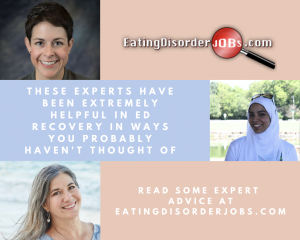You don’t have to be a registered dietitian or therapist to help out those with Eating Disorders. We interviewed a whole bunch of experts who do treatment in ways you probably have never even thought of. Read their advice below:

“It is not uncommon for individuals to have a personal connection to the work they do, which can make them excellent stewards for change. I have found it to be particularly important to have reached a steady point in one’s mental health where you’re able to engage responsibly and diligently in the work that is so close to your heart. That certainly doesn’t mean someone can’t have a lived experience and not get emotional during this work. However, it requires great self-reflection, healing and taking care of your health first. There are so many ways to support work in mental health fields without it consuming your 9-5. I would encourage individuals to think broadly about the contribution they want to make and how working on yourself is a cornerstone of whatever contribution we give to the world.” – Allison Ivie
“It can be very intimidating to go against the grain, once you start unpacking weight stigma — especially when so many educational institutions and health service providers do not practice in ways that respect and protect all bodies. So be that person who speaks up. Set boundaries. Have difficult conversations and have them unapologetically. You will get better at it with time.” – Fatmah H. Al-Qadfan, Registered Drama Therapist
“Every job is an opportunity to learn – even if what you learn is you don’t want to work there anymore. In other words, take what you can from each job, nothing is beneath you, but know that when you go out on your own, you don’thave to do things the way others do. Remember the things that infuriate you so you don’t recreate those situations later. Take risks and try not to let your worry of what others think hold you back. Apply for any job that interests you, even if you don’t have the requested years of experience. Sometimes enthusiasm overrides those requirements. And please, please, please find someone you can talk to about your own issues, history and internal reactions. Whether it’s a professional supervisor, therapist, professional support group, or someone in your personal support system, it’s so crucial to your mental health to have a safe place to vent and explore your personal reactions to what you’re experiencing at work.” – Jessica Setnick, MS, RD, CEDRD-S
“Cultivate healthy doses of curiosity and creativity, develop a sense of humor, and find where your passion lies. Working effectively with eating disorders requires an ability to look at both the bigger picture and the details, to use your intuition as well as your intellect, and to think outside of the box. I would also recommend a commitment to personal growth and spiritual development so that you know how to feed your soul — since much of the work is teaching those you work with how to do just that.” – Anita Johnston
Check out these experts’ full interviews at https://eatingdisorderjobs.com/category/advice-from-experts/ and search the right column for their name.
